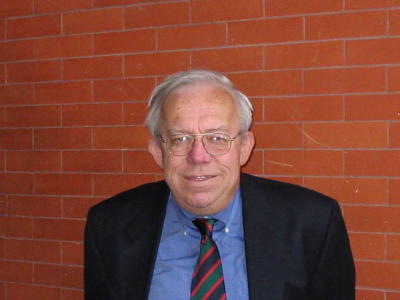 Dr. Dennis Showalter
Dr. Dennis Showalter
Distinguished Speaker
Professor
History Department
Colorado College
Colorado Springs, CO 80903-3298
USA
DShowalter@ColoradoCollege.edu
Buffy Goes to War: The Introductions of Military Genre Conventions in the Seventh Season of Buffy the Vampire Slayer
[Click on the link above to see this paper's placement in the SCBtVS Program.]
|
Buffy’s final season proved inexplicably disconcerting to a significant proportion of the show’s fans and critics. Unlike earlier years, whose issues were relatively clear, Season 7 generated a discomfort that transcended particular characters and story arcs. This paper suggests that reaction reflected the introduction of a new paradigm that moved the show strongly in the direction of a military story line without firmly establishing the shift. The writers, moreover, lacked the familiarity—and probably the empathy-- with that complicated genre to present the format convincingly.
For its first three years definitely, and arguably for Seasons 4 and 5 as well, the series format was of a “police” show. The task of the group was to provide security from external dangers to a community that was essentially indifferent or unaware—a mission symbolized at the end of S3 by Buffy being named “class protector.” While the principal threats were described in apocalyptic terms, they were in practice localized and personalized. S2’s Angelus /Acathla was ultimately a Buffy/Angel story. Even Glory only wanted to go home—the damage that would have inflicted on Buffy’s world was collateral, not intentional.
The paradigm began shifting in S5 as Buffy developed symptoms of “traumatic stress fatigue”---what in World War I would have been called shell-shock. By S6, the entire Scooby gang is affected one way or another by their participation in a “forever war.” Willow in particular is better understood as a PTSD case than either a grieving lover or a magic addict. Then in S 7 the story line overtly takes the gang from a policing mission into an all-out war. “We’re going to become an army,” Buffy declares. My proposed paper describes that process, discussing the development of story lines and characters along lines first presented in classic war stories like “Dawn Patrol,” “Sands of Iwo Jima,” and “Glory” Buffy, for example, does not become “General Buffy,” but Lieutenant Buffy, who must train, inspire, and ultimately lead the potentials Willow’s character is similarly modeled on the pilot who has flown too many missions, the infantryman who has made too many patrols. All she needs in many episodes is a half-empty whisky bottle on the table in front of her. Story lines like the shift from S5 Buffy, refusing to lose anyone, to S7 Buffy, almost cold-blooded in accepting casualties, are less confusing when interpreted in the context of military fiction. Similarly Buffy’s exhortation to Faith when she assumes leadership , however briefly, reprises almost word for word Henry Fonda’s classic injunction to John Wayne in “Fort Apache:” “When you command this regiment, command it!”
I do not suggest the military paradigm replaces the show’s core issues of gender identity and female empowerment. I do believe the S7 format presents those issues from a fresh perspective. To cite only one example, the sharing of power in “Chosen” may be a feminist trope, but it is also a stock theme of military fiction. I believe a paper developing that thesis will be a useful contribution to the conference, and hope that you can find space for it. |